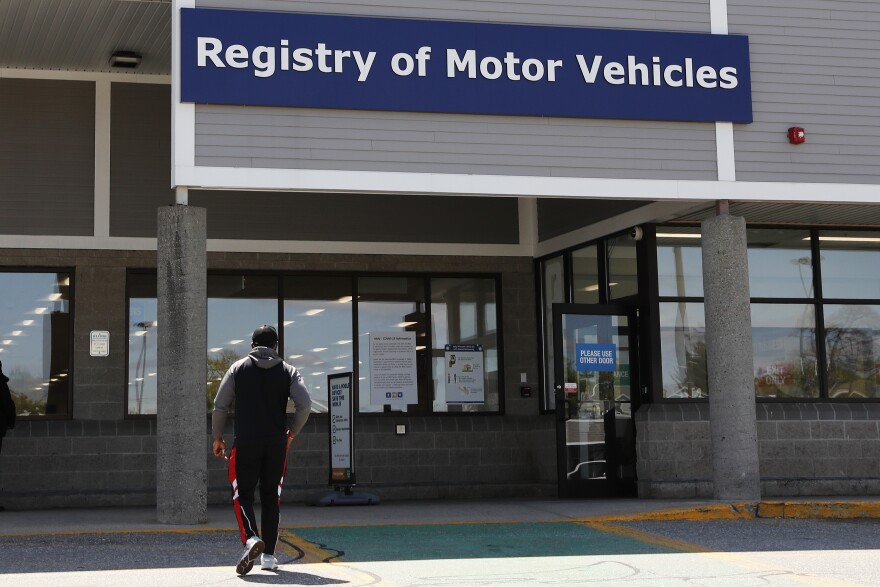Jose switched his Nissan Altima standard into gear and headed out onto I-91 to show me the car dealership he helped build as a drywall worker.
He’s been driving in the U.S. without a license for almost 25 years. He said he always drives the speed limit and checks his lights.
“I never got tickets. Never got [pulled over]. I always try to be aware and to drive like real, real carefully trying to avoid accidents,” Jose said.
We’re not using Jose’s full name because he’s afraid of deportation. He left his home in Mexico City and traveled to western Massachusetts in 2006, he said, for a better life.
The 40-year-old said he needs a car to get to construction sites in Springfield and around Hartford.
“We want to have the chance, just only the chance to follow the American dream,” Jose said. “Not to be afraid when the police stop behind you. You're afraid they're going to stop you or they're going to take your car away from you.”
He also has two young kids who were born in Massachusetts.
“I have to bring the kids to any activities they do after school. It can be swimming, it can be taekwondo, it can be soccer, football. You need the car to move all over the place,” Jose said.
Jose said he’s planning on getting a license through a new state law known as the Work and Family Mobility Act, which goes into effect in Massachusetts on July 1. It allows immigrants without legal status in the U.S. to apply for a driver's license.
Opponents got a question on the November 2022 ballot, asking voters to repeal the law before it took effect. A majority of voters supported keeping it in place.
Eighteen other states, including Vermont and Connecticut, have enacted similar laws.
“I think this is going to be a huge help for folks, especially out in the western part of the state where public transportation is so much more limited,” said Sarang Sekhavat, political director of the Massachusetts Immigrant and Refugee Advocacy Coalition.
Sekhavat said immigrants like Jose will have to show multiple documents including a foreign passport, birth certificate or foreign national ID — just to name a few — to prove their identity.
“They're going to have to be getting those documents from their consulates. They can't just go to Social Security and get a new card or a new passport from the State Department, for example. They have to go through consulates and that can take a really long time,” Sekhavat said.
Many advocates are also concerned about whether or not undocumented immigrants will have their personal information shared with federal authorities.
Massachusetts Attorney General Andrea Campbell’s office is tasked with outlining specific protections for undocumented immigrants applying for a license.
“There are protections written into the bill, and the Attorney General's office is actually supposed to be coming out with a regulatory framework for how to protect that information,” Sekhavat said.
A representative from Campbell’s office said they’re in the process of finalizing the new regulations.
Emily Rodriguez from Pioneer Valley Project, a Springfield-based community organization, said the group is helping immigrants in the city get their documents together. She is anticipating barriers to obtaining paperwork from consulates.
“It's been really, really hard to connect to their country's consulates because of the pandemic,” Rodriguez said. “A lot of the consulates are not working the same way. They don't have the same hours and they don't have the capacity or the staff to help the community.”
Rodriguez said most immigrants they’re working with need to renew their foreign passport. It’s unknown how much time it’ll take for consulates to process those renewals. She said the consulate of Mexico, for example, stopped most services during the pandemic.
“Now they're starting to do [the] process in Boston. But you have to make an appointment. And imagine, if you don't have a driver's license or you don't have a vehicle, you have to drive to Boston. You have to find somebody to take you there. So it's been really difficult for the families to be able to go there,” Rodriguez said.
Once they do get those documents, they still have to get an appointment at the RMV — and pass written and road tests.
Jose hasn’t started gathering his documents yet and knows it’s going to be a long wait. Despite these challenges, he said he has to stay positive and make the most of this opportunity.
“While I'm over here in this position, I'm trying to earn to be an American,” Jose said. “I'm trying to do the best I can to contribute to the economy [and] to help everybody around me. It’s just the way I am. I couldn’t get the [legal immigration] documents, but I’m just trying to do my best to be a good American.”
Massachusetts officials expect about 100,000 undocumented immigrants to apply for a driver’s license.
The RMV said it’s expanding call center staffing and customer service by 50%, as well as providing application forms in 15 different languages.




